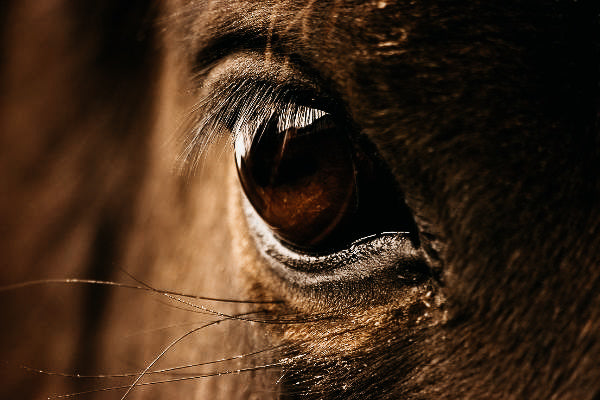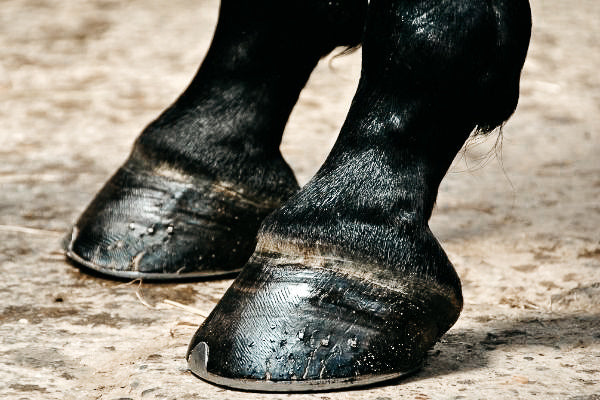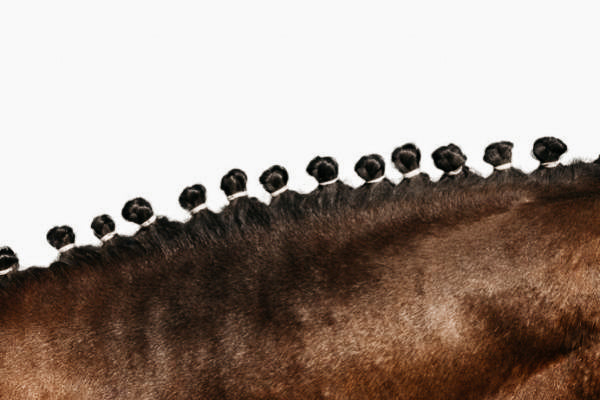
Periodic eye inflammation – what you should know!
Perhaps you have heard the term moon blindness before? This term actually stands for periodic eye inflammation (short: ERU, long: equine recurrent uevitis). In fact, almost 12% of the horse population worldwide suffer from this recurring disease with unfortunate consequences. A horse disease that causes many horse owners to have uneasy thoughts.
How do I even recognize the disease?
What if?
Can I prevent my partner from even being part of the target group?
Perhaps our magazine article will give you some insight into the topic, because dealing with it as a horse owner or rider is a good way to go.
Periodic eye inflammation in horses - Definition:
This horse disease, also known as moon blindness, is an inflammation of the internal structures of the eye that recurs at intervals and can even lead to a detachment of the retina. Unfortunately, the latter results in horse eye blindness. These so-called inflammatory attacks are indeterminate and can have different symptoms and strengths depending on the “infestation”.
If, for example, the front parts of the horse's eye are affected, the animal shows clear symptoms and is visibly in pain.
If the back part is inflamed, there is hardly any pain and the flare-ups of inflammation often go unnoticed. It is understandable that the diagnosis is often difficult to determine. Unfortunately, this undetected damage can no longer be reversed.
And moon blindness because it was previously thought that the periodic lunar cycle had an influence on the inflammatory processes in the eye.
There are also 3 different phases of periodic eye inflammation in horses:
- The first episode of inflammation (acute)
- The inflammation-free interval. However, signs of flare-ups are visible.
- One or more recurring (recurrent) inflammatory attacks
Symptoms:
Clinical signs may vary. This means that horse illness does not always show up straight away. There may be differences depending on the severity. Symptoms can appear gradually or suddenly.
In up to 30% of cases, the horse becomes ill in both eyes at the same time.
The most important identifying features are:
- strong squinting of the eyelids, blinking
- Tear flow
- Eyelid swelling
- Lid may be warm
- Photophobia
- Conjunctiva is red
- Cornea is cloudy (smoky-flaky)
- Constriction of the pupil
- Pain
- Horse no longer likes to be petted near the eyes
- Apathy
- Fever
- possibly. Painful face (ears back, nostrils wrinkled, mouth pinched)
The following symptoms can be recognized after one or more attacks:
- the cornea is permanently cloudy
- the lens also becomes cloudy
- Changes in shape and/or color of the iris
- Detachment of the retina
- Clouding of the vitreous body
Diagnosis
Important:
Any other horse disease that affects the horse's eye must be ruled out by the veterinarian or the horse clinic! These are e.g. b Meningitis, glaucoma or abscesses.
If leptospires (bacteria) can be detected in the eye, the horse can still be helped. A cure would even be possible if the horse's eye has not yet been too damaged. However, there is no way around a vitrectomy (see explanation below).
In this case, moon blindness is then given the name IERU (leptospira-related ERU).
Periodic eye inflammation in horses ERU - treatment and drug approach
If the detection stage was recognized early, anti-inflammatory ointments/drops (containing cortisone) or antibiotics (for IERU) are prescribed.
If periodic eye inflammation in horses is in full swing, muscle-paralyzing, pupil-dilating medications are used. These reduce pain and prevent sticking.
Corticosteroids (intravenously) can also help to combat inflammation. In the case of very strong attacks, these are even injected into the conjunctiva. There is also a catheter that can be used to wash the eyes and add medication.
Today it is also possible to place an implant (virus inhibitor) with active ingredients in the animal's eye. Over a longer period of time, this releases the appropriate amount of active ingredient of a medication in a dosed manner. Drops or ointments are no longer needed during this time.
Another surgical measure would be vitrectomy. During this operation, the vitreous humor in the horse's eye is crushed and removed. Any inflammation and cloudiness are removed. The visual value is significantly improved.
An already blind horse also needs help. This means that a diseased, extremely painful eye should be removed under general anesthesia. The pain center disappears and the animal can find joy in life again.
A horse that is partially blind may be handicapped for us, but they actually get along well with it. Most horses can hardly notice the “restriction” after a short period of time.
These procedures are of course carried out sterilely in a horse clinic.
Are there any preventive measures that can prevent an outbreak of the disease?
Since the cause of the disease is not yet fully understood, it is difficult. There is talk of leptospira, steptococci, allergic reactions, viral infections, autoimmune diseases, autointoxications and even heredity.
Good, we already had the leptospires above - these can then be initially treated with antibiotics via the vet/horse clinic. This bacterial strain or However, the resulting infection can be “contained” preventatively. The main hosts of these leptospires are rodents. Have you ever seen a mouse scurrying around in the stable? If not, fine. If so, targeted combat should definitely take place here. Horse food standing around is a land of milk and honey for the little rodents. And it is precisely in their urine (in sick mice!) that the leptospires are found. Not every horse gets sick from it, but periodic eye inflammation in horses (IREU) is no accident.
So what to do?
- Do not leave horse feed open (feeding bins are great!)
- Regular cleaning of the feeding chamber and all feeding containers
- Keep order (so the mice/rats have no opportunity to escape or even settle)
- Avoid damp areas in the rooms
- Always check drinking troughs and clean them regularly
- make sure that the hay stays clean (mice love to scurry around here!)
Moon blindness is the most common cause of blindness. Once the eye is damaged, there is no cure. If you suspect something, you should organize an appointment with the vet immediately!
Discover more posts

5 tips for hoof care – user-friendly and effective
Perhaps the saying "No hoof - no horse" tells you! something? That pretty much sums up the topic. Many horse diseases such as: b. Thrush or hoof ulcers can be best prevented through ...
Continue reading
Animalon's tournament tips for good success in the tournament season
You are happy because you will take part in a tournament with your horse. But alongside the anticipation there are also doubts. Hopefully I'll think of everything. What do I have to take with ...
Continue reading
